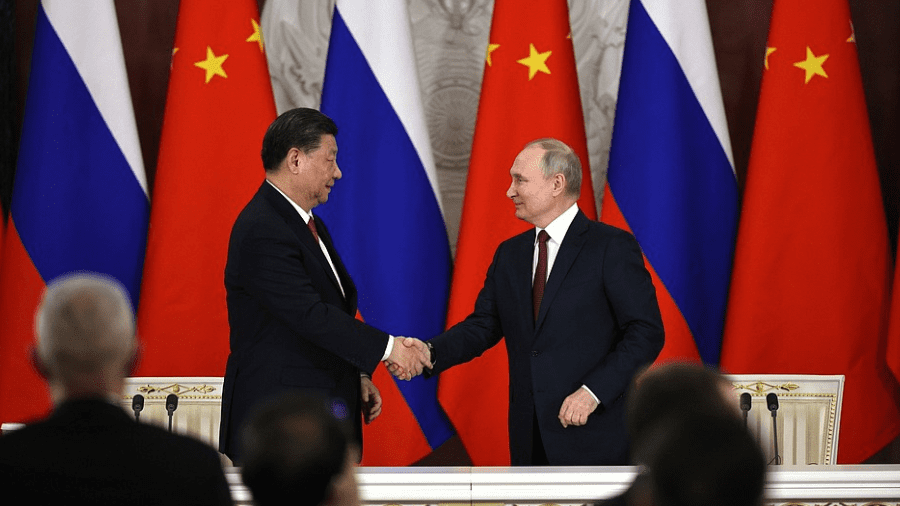This article originally appeared in the National Post.
By Balkan Devlen, March 24, 2023
As the world watches what will come out of this week’s summit of two dictators, it is important to step back and examine what drives this relationship and what must be done to confront the challenge it presents.
Chinese leader Xi Jinping landed in Moscow to meet and posture with Russian President Vladimir Putin just 72 hours after the International Criminal Court (ICC) made Putin a man wanted for war crimes, over Russia’s atrocities in Ukraine.
Around the globe, democracies are sizing up the new authoritarian threat that Russia and China are looking to accelerate. This despotic axis is driven by a neo-authoritarian ideology that is obsessed with regime security and convinced that the West is in irreversible decline.
Their hostility to human rights and democracy is matched only by their determination to make the world safe for authoritarianism, a goal they pursue ruthlessly, using tactics from subversion to cyberattacks to naked aggression. The Putin and Xi regimes genuinely threaten the rules-based international order and all who defend it, determined instead to cultivate a world of autocracy based on an “Animal Farm” interpretation of sovereignty in which not all countries are genuinely sovereign.
As Russia’s criminal re-invasion of Ukraine demonstrates, Canada and its allies and partners must acknowledge and confront this challenge head-on. Although there are existing and potential differences between the two countries, they are not strong enough in short to medium-term to override the primary drivers of this axis. Ignoring this authoritarian partnership, in hopes it will simply peter out, is shortsighted thinking. Likewise, attempting to drive a wedge between Russia and China is also futile as it fails to understand the deep structural factors that unite them.
A multilayered and multilateral strategy is needed. Based on U.S.-led measures to mitigate the effects of Sino-Russian alignment, the approach must also be complemented by a dual-containment strategy of Russia and China by the West and other democratic partners. Such a restraint mechanism must involve the U.S., the EU, Canada, and other like-minded partners in relevant regions such as Japan, South Korea, India, Taiwan, and Ukraine.
In our own country alone, the impact of authoritarian regimes on our society has become quite evident. These regimes are working energetically to disrupt Canada’s social cohesion and institutions through such means as kidnapping Canadian citizens, influencing institutional operations, spreading disinformation, interfering in elections, and intimidating human rights activists and political dissidents. With minds like Xi and Putin at the helm, the aggressions will only worsen if authoritarian reaches are allowed to take root, each time further emboldening the oppressors.
It is not folly to imagine how Canadians would face significant restrictions on their freedom of expression, assembly, and association if they failed to comply with the desires of these regimes. Canada relies on a stable, free, and open, rules-based international order to maintain its security and prosperity. Over the last eight decades, Canadians have invested significant resources and sacrificed a great deal to defend and uphold this order. However, if the axis of Putin and Xi determines the rules of the game, Canada’s security, prosperity, and internal stability will be in peril.
Canada must invest more in defence and security to protect ourselves and our interests, recognizing that the world is increasingly dangerous. Meeting the NATO defence spending target of two per cent of GDP is critical — beyond negotiable — but it’s not enough. We must also sustainably support defence and dual-use technology innovation here in Canada. Investing in intelligence and counterintelligence capabilities is simply vital to safeguarding Canadians from subversion and cognitive warfare.
Moreover, Canada can also be a valuable resource for its allies and the democratic world, given our status as a natural resource superpower. We can help other countries reduce or eliminate their reliance on authoritarian regimes for energy, transition away from dirty coal, and commit to a reliable supply of critical minerals. We can also help combat hunger by increasing agricultural exports to those affected by Russia’s war in Ukraine.
This week’s dynamics in Moscow illustrate that democracies must stand up to the authoritarian axis. The despotic regimes of Putin and Xi are acting in concert to undermine democratic societies and subvert international norms.
Generations of democratic citizens around the world have grown up to believe that the rules-based international order, liberal democracy, and individual rights and freedoms are as permanent and natural as gravity. The truth is that sustaining these core values is utterly dependent on our ability and willingness to confront the challenge that we are now seeing more clearly than ever.
Balkan Devlen is a senior fellow at the Macdonald-Laurier Institute, where he leads the Transatlantic Program.






